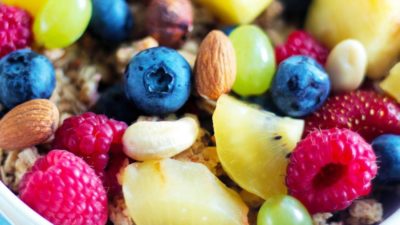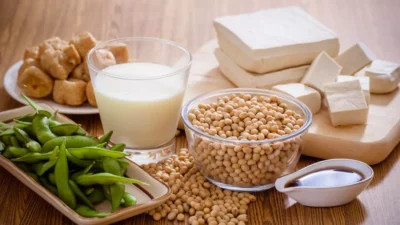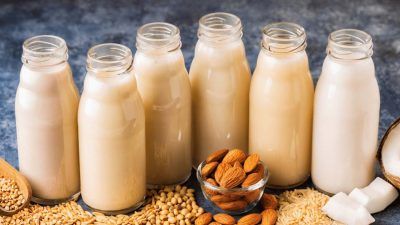10 Essential Pantry Items for Healthy Vegans

If you only had room in your kitchen cupboards for 10 of the healthiest plant-based foods, what would they be? The staple foods included here will create a solid base onto which you can build the best diet for your individual needs.
1. Nutritional Yeast aka ‘Nooch’
Most seasoned vegans are well aware of nooch but newcomers to a plant-based diet may be wondering what on Earth it is. Nutritional yeast doesn’t have a very appealing name but once it enters your life, you’ll be friends forever. It plays a vital role in making sauces “cheesy” and can even just be sprinkled on food instead of salt.
Fortified versions contain high levels of B12 and B9 (folic acid). All B vitamins help the body produce energy from food. Vitamin B12 also helps maintain healthy nerve cells and helps in the production of DNA, the body’s genetic material. Vitamin B12 works closely with folic acid, to make red blood cells, to help iron work better in the body and to produce a compound involved in immune function and mood.
2. Tofu (calcium-set)
Tofu is one of the most versatile ingredients available. It can be marinated and fried in stir-fries, tossed into curries, used to make quiches, blended to make chocolate mousses and “cheesecakes”, and even thrown into a smoothie for extra protein. Once you get the knack for cooking with it, you’ll wonder how anyone can call it bland.
It’s a great source of protein and calcium. Just be sure to buy calcium-set tofu – check for calcium carbonate in the ingredients. Soya has been shown to reduce the risk of breast cancer in women and, as a type of unfermented soya (as opposed to tempeh which is fermented), tofu has been shown to lower the risk of prostate cancer in men. It also contains all eight of the essential amino acids which are the building blocks for protein, a wide range of vitamins and minerals including manganese, selenium and phosphorus, and may reduce your risk of heart disease and diabetes.
3. Bananas
Eaten on their own as an energy-packed on-the-go snack, sliced and enjoyed with peanut butter on toast, or chopped and frozen before being blended to make “nice cream”, it’s no wonder bananas are one of the most universally loved fruits.
Bananas are sweet and the carbohydrates they contain are a unique and healthy mix. A medium banana contains about three grams of fibre, 14 grams of sugar and six grams of starch. It means that sugars in the banana are digested relatively slowly, thanks to the fibre content.
One medium banana covers about 12 per cent of your daily potassium needs and they are a good source of vitamins C, B6 and magnesium.
Bananas are very low in fat but contain phytosterols which can help lower your cholesterol levels as they block some cholesterol receptors in the intestine and reduce the amount of cholesterol your body can absorb. Bananas are an excellent source of tryptophan which helps your body produce more serotonin, which makes you feel and sleep better.
4. Avocados
Smash them on sourdough toast, use them to make guacamole or toss into a salad. Some cafes even use them in iced coffee to add creaminess.
About three-quarters of an avocado’s energy comes from fat and most of it is monounsaturated oleic acid – also found in olives. Oleic acid has cholesterol and blood pressure lowering properties. And so do phytosterols – natural compounds abundant in avocados that help lower bad cholesterol and are anti-inflammatory.
Even though high in fat, avocados are healthy and all the fat has yet another benefit – it helps the absorption of health-protective carotenoids. In the human body, they act as antioxidants, protecting our organs from damage by free radicals. This is especially important for your blood vessels, eyes, kidneys, liver and in the prevention of cancer. If you add some avocado to a meal with other carotenoid-rich but low-fat foods – such as spinach, kale, chard, various lettuces, carrots, sweet potatoes, peppers – it will increase the absorption of carotenoids from these vegetables.
Avocados also pack a good portion of some essential vitamins. One medium avocado gives you a good dose of vitamins C, E, K, B6, folic acid and pantothenic acid (from the B group).
5. Nuts
Nuts are among the most nutrient-dense foods you can find and different types have different benefits. To get a good range of vitamins and minerals, mixed nuts are the answer but if you could only choose two make it walnuts and Brazils.
Walnuts have the highest antioxidant potential of any nut and considerably higher than many fruits and vegetables. Walnuts are also higher in the omega-3 fat ALA than any other nut, which is converted by the body into a different omega-3 fat, known as DHA. DHA is thought to help regulate serotonin and dopamine, which influence mood and sleep. They’re also a great natural source of melatonin – a hormone that regulates sleep.
Brazil nuts are an excellent source of the important mineral selenium. Selenium is a key part of our cell defence mechanism and acts as an antioxidant. It is also needed for the correct functioning of the thyroid gland and plays a role in fertility. Consuming just two Brazil nuts a day for 12 weeks can increase the amount of selenium in the blood by over 60 per cent.
6. Cruciferous vegetables (broccoli, kale, cauliflower etc)
The reason why these green powerhouses are so highly praised is that all cruciferous vegetables contain very powerful natural compounds, called glucosinolates, that have a strong cancer-fighting effect.
Cruciferous vegetables are packed with antioxidants which help maintain good health, protect your organs and strengthen your immune system. Most of these veggies also contain a specific type of antioxidants called carotenoids (lutein, zeaxanthin and beta-carotene) that are very helpful for protecting your eyes against age-related deterioration. Beta-carotene is a precursor to vitamin A and cruciferous vegetables are a great source.
The cruciferous family is also a good source of other essential nutrients such as folic acid (folate), vitamins C, E and K and fibre. Vitamin K plays an important role in blood chemistry, calcium metabolism and regulates inflammatory response of the body. We only need very little of it so any dose of cruciferous vegetables will cover the need. On top of that, cruciferous veggies pack a good dose of minerals such as calcium, potassium and iron, contain a fair amount of protein and even contain some omega-3 fats.
7. Tinned pulses (beans, lentils, chickpeas etc)
Beans are a great source of protein, complex carbohydrates, several B vitamins, vitamin K, calcium, potassium, iron and zinc. They offer an excellent nutritional package and that’s why they are a part of most traditional cuisines across the world. The variety and versatility means there are very few dishes that couldn’t benefit from some beans. They can be used in chillis, curries, burritos, salads, falafels, hummus or piled onto toast and topped with avocado and nooch for a quick, filling lunch.
Thanks to their protein and complex carbohydrates, they help stabilise blood sugar and so are great at preventing and managing type 2 diabetes. The combination of protein and fibre slows down your digestion, making you feel fuller for longer. At the same time, the complex carbohydrates provide healthy energy so you feel great and are less likely to overeat.
Being a great source of fibre makes beans excellent for your digestive health, feeding your friendly gut bacteria and reducing your risk of colon cancer. The fibre is also helpful in heart disease prevention and treatment. According to research, if you eat chickpeas regularly, it reduces the levels of fats and cholesterol in your blood, slashing your risk of high blood pressure and blood vessel narrowing (atherosclerosis).
8. Tinned tomatoes
Tinned tomatoes are an absolute essential pantry item. Use them in chillis, curries, pasta sauces and all manner of warming vegetable dishes.
Tomatoes are rich in vitamin C and are the only fruit or vegetable that doesn’t lose much of its nutritional value when tinned. In fact, the protein and fibre levels are actually a little higher than in fresh tomatoes.
Tinned tomatoes also have more of the red pigment lycopene, which is a big health bonus. This red pigment is a strong antioxidant which has been linked to many health benefits, including reduced risk of heart disease, prostate cancer and macular degeneration (vision deterioration).
The redder the tomato, the more lycopene it contains and it’s the most concentrated in the peel. Tomato products, such as tomato juice, tomato puree and tomato-based sauces, actually contain more lycopene than fresh tomatoes because they are more concentrated. Cooking also increases the lycopene content. And you can up your intake even more if you have some healthy fats (eg avocado) along with your toms as fat increases the absorption of lycopene.
9. Oats
Oats are, quite simply, amazing. This humble grain has so many nutrients and health benefits that if there ever was a superfood, oats are it!
Oats are a great source of healthy carbohydrates, including fibre, are low in fat and, perhaps surprisingly, high in protein. They contain both soluble and insoluble fibre – essential for a healthy digestive system and important for effective sugar and fat metabolism. Because soluble fibre slows down the speed of digestion, oats can give you sustainable energy to last through the day and keep you feeling fuller for longer. They pack a good bunch of vitamins and minerals too – several B vitamins, iron, magnesium, potassium, zinc, copper and manganese.
Overnight oats or porridge is a great way to start the day. Oats can be added to smoothies if you have a good blender, and they can even be used to make healthy cookies.
10. Fortified plant milks
The choice of cow’s milk alternatives is growing all the time. There’s soya, almond, rice, oat, hemp, cashew, coconut… the list goes on. Oat milk is often a favourite with coffee drinkers because of its creamy texture while soya milk is great for everything else.
Soya milk is an excellent source of nutrients. It is made from soya beans and contains the same amount of protein as dairy milk, all eight of the essential amino acids which the human body needs, is rich in polyunsaturated fatty acids, including omega-3, and is cholesterol free. It contains less saturated fat and more unsaturated fats than cow’s milk and fortified versions are an excellent source of B vitamins, B12, calcium and vitamin D. Soya also contains fibre, which is important for good bowel health and can help lower cholesterol. Be wary of flavoured and sweetened soya milks though due to the sugar content – try and go for low sugar or unsweetened versions.
Many myths abound about soya, one of them being that the phytoestrogen (plant hormones) it contains messes with our hormones and has a feminising effect. This myth is based on animal experiments and human studies show that soya phytoestrogens are completely safe and even beneficial to our health. Read more about soya here.
Bonus:
11. Flaxseed
This extraordinary seed contains high amounts of the omega-3 fat ALA (alpha-linolenic acid) and is the richest plant source of omega-3.
A great habit to cultivate is to have two tablespoons of ground flaxseed daily – enough to cover your daily omega-3 needs. Just remember, it can be destroyed by heat so should be added either to cold meals, such as morning cereal or smoothie, or to meals after they’ve been cooked in order to preserve its nutritional qualities.
Flaxseed contains a wealth of antioxidants and among them, lignans are the most potent. This humble seed contains 75 to 800 times more lignans than other plant foods and its ability to reduce blood pressure, cholesterol and blood sugar are ascribed to these extraordinary antioxidants. They may also make your blood vessels healthier because they are anti-inflammatory so helping to soothe the irritation caused by everyday damage.
Other benefits of flaxseed consumption include its high soluble fibre content that helps to regulate blood sugar and cholesterol levels, its positive effects on heart health and potential cancer-fighting properties.
Whole flaxseeds are very stable and keep well but their tough skin prevents absorption of their nutrients in the body (they go straight through you!), which is why we should always consume them ground or milled. You can buy pre-ground flaxseed or grind them yourself before using. Once they’ve been ground, store them in an airtight container in the fridge or freezer to preserve their goodness and stop them going off.
If you keep these items stocked up in your kitchen, you won’t go too far wrong. There are however many other foods with a whole host of incredible health benefits and we should always aim to eat as wide a variety as possible. To find out what they are, visit our A-Z of Foods. And for more recipe ideas including all of these ingredients, be sure to join our Vegan Recipe Club.







